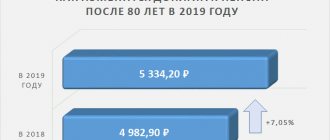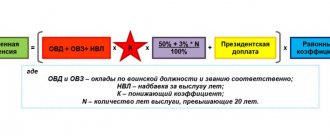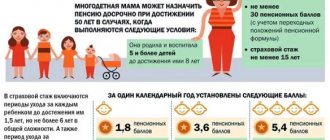The status of a judge in Russia provides not only a high position and a decent salary, but also large pension payments, the size of which is comparable to the salary of a judge.
And these payments are also calculated differently from ordinary people. In this publication, we will look at the types of pensions for former judges and find out how much they receive.
Types of payments for retired judges
Citizens of the Russian Federation who have at least twenty years of legal experience, which were spent in the following positions, can receive pension benefits:
- arbitrator or judge, regardless of category;
- prosecutor, lawyer, their deputies and assistants (or any other profession requiring specialized legal education);
- judicial authorities, any position related to legal proceedings.
A judge who has retired or changed positions, starting at age 55 (50 for women), can apply for one of three types of payments:
- Standard insurance pension paid to Russian citizens on a general basis.
- Longevity security (Law 4468-I).
- Lifetime maintenance (Law 3132-I).
The insurance pension is calculated in accordance with payments deducted monthly from the judge’s salary to the Pension Fund. Despite the fact that the final amount is noticeably higher than the national average, this type of judge’s pension is the smallest, so you should only apply for it if you do not have enough experience for the second and third options. A judge who has worked for less than 10 years in the legal field is not entitled to a specialized pension.
With 25 years of service, a judge has the right to immediate retirement based on length of service , even if retirement age has not yet been reached. In contrast to the third point with monetary allowance, payment of salary based on length of service is carried out according to Law No. 4468-I, common to all employees of law enforcement agencies. Article 14 states that a pensioner has the right to receive benefits from 50 to 85% of salary depending on length of service (50% after 20 years, then an additional 3 percent for each subsequent year).
Upon reaching 20 years of experience, a lawyer has the right to choose a monthly lifetime allowance amounting to 80 to 85% of the earnings of an active judge in a similar position. The size of the percentage depends on the length of service - for each additional year one percent is added. The option of lifelong maintenance is described in the specialized law 3132-I on the status of judges.
Support for judges of the Constitutional Court is stipulated by a separate government decree number 425
Also, Resolution No. 425 describes the procedure for payments to dependents and family members of a deceased (or deceased) judge, if at the time of death he has not yet resigned.
Additional material support
In addition to the basic pension or lifelong salary, a judge can receive payments in the presence of state awards. Article 1 No. 21-FZ defines the following categories of persons who are entitled to additional security:
- Heroes of the USSR and Russia;
- awarded the orders of St. Andrew the First-Called, Glory, Lenin, “For Services to the Fatherland”, “For Service to the Motherland”;
- winners of state awards of the USSR and the Russian Federation;
- champions of the Olympic and Paralympic Games.
The amount of payments is indicated in the second article of the same law and ranges from 250 to 415 percent of the all-Russian social pension.
What is PSS?
Expert opinion
Polyakov Kirill Yaroslavovich
Lawyer with 7 years of experience. Specialization: criminal law. Extensive experience in drafting contracts.
PSS is exactly what we are used to understanding as a judge’s pension in the Russian Federation. Retired judges, judges who have become arbitrators, who have switched to work in government organizations and who have:
- twenty years of judging experience;
- less than twenty years of judicial experience, but having reached the minimum age of fifty years for female judges and fifty-five years for male judges;
- Judicial experience of at least ten years, cumulative legal experience = 25 years and have reached retirement age (60 and 55 years for men and women, respectively);
To assign a PSS, years of work are calculated:
- in Russian courts of all categories as judges or arbitrators;
- in the apparatus of the courts of the Russian Federation in other positions, as well as in the apparatus and institutions of the Ministry of Justice;
- lawyer, investigator, assistant, deputy or directly prosecutor, as well as in another position where legal education is necessary.
Lifetime pension amount
Like most civil servants, judges' salaries are quite low: the head of the Constitutional Court receives just over 30 thousand rubles monthly. At the same time, a system of incentives and modifiers works: for a working judge, the bonus only for the qualification class ranges from 30 to 150%.
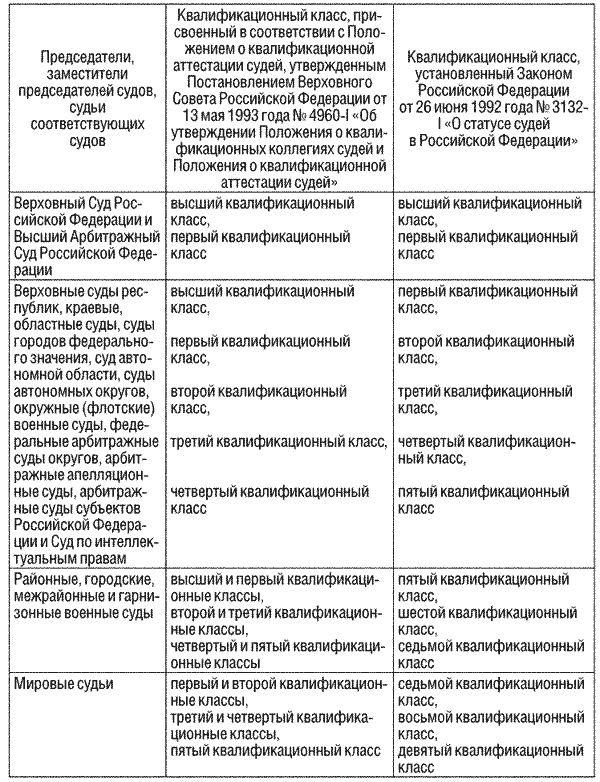
Table of qualification classes of judges
Most bonuses received while in service are not included in the regular pension. In the case of pension benefits, the amount of payments will be affected by:
- length of service (as indicated above - from 80 to 85%);
- the title of professor or associate professor, as well as Honored Lawyer of the country;
- candidate and doctoral degrees;
- knowledge and use of foreign languages in international affairs (up to 20% for judges of the Constitutional Court).
Important! Judges' pensions are not taxed, which is another feature of these payments.
Table. Judge's salary depending on length of service
| Length of service | Percentage increase |
| From 24 to 60 months | 15% |
| From 60 to 120 months | 25% |
| From 120 to 180 months | 30% |
| From 180 to 240 months | 40% |
| More than 240 months | 50% |
*The term bonus is not cumulative and is calculated from the starting salary.
Since 2012, a judge’s work experience includes military service, training in a specialty, and service in government departments. The general “legal” experience includes work in law firms, investigative and prosecutorial bodies, and private practice.
Scientific degrees and titles also provide a percentage increase. A candidate or associate professor will receive 5% of the salary standard, all others will receive 10%. A regional coefficient is also considered: working in the Far North or the Far North of the country will be noticeably more profitable both in terms of accrued length of service and in terms of total salary (standard modifier x1.5).
In practice, even a low class judge with sufficient length of service gives the right to earn 70-80 thousand rubles. Payments are made directly from the federal budget; the regional administration can only pay additionally to all judges at the same time, setting increased coefficients.
Retirement
Retirement is allowed upon reaching retirement age, for men - 60 years, for women - 55. However, the judicial community has some privileges in this area. When working in the Far North, experience is calculated at one and a half times the same as in normal areas.
For certain categories, pensions are not taxed.
At what age do judges retire?
There are no age restrictions for serving as judges. However, the age limit for holding office is 70 years. Thus, if you want to leave your post, you can use the reference to the generally accepted ages of 55 and 60 years.
To apply for a pension payment, you must provide the following documents:
- An application with a mandatory indication of the reason for resignation - age, illness, layoff.
- Identification.
- Papers proving the level of qualifications.
- Employment history.
- Evidence of work in the legal field.
- Documents on the actual assignment of rank, class, etc.
- Extract on the amount of the current pension.
This list may expand depending on the reason for retirement and the area where powers are exercised.
All documentation is transferred to the authorized Commission, which within 15 days makes a decision on assigning a pension to the applicant or refusing payments. If the appointment occurs, payments are made the following month. If there is another pension, its payment is terminated, and the newly established one is paid.
Early retirement
Early old age pension can be awarded to judges who have administered justice for a long time in the Far North. You must work in the territory for at least 15 years. Also, early release of a position and assignment of payments is possible in case of illness.
Papers proving the exercise of powers in the regions of the Far North are added to the list of documentation.
Retirement due to illness
Resignation for health reasons can happen to anyone. If a judge is forced to leave his post precisely for this reason, then he retains all the preferences due to him while in office. The judge retains free medical care, payment of a lump sum, and continued participation in the judicial community.
In this case, the Commission must be provided with a medical commission’s conclusion on the impossibility of further continuation of service.
Calculation of a judge's pension
When applying for a pension, the judge chooses one of three options. It is not permitted to receive multiple state pension options at the same time. The easiest way to show the practice of calculation is with specific examples.
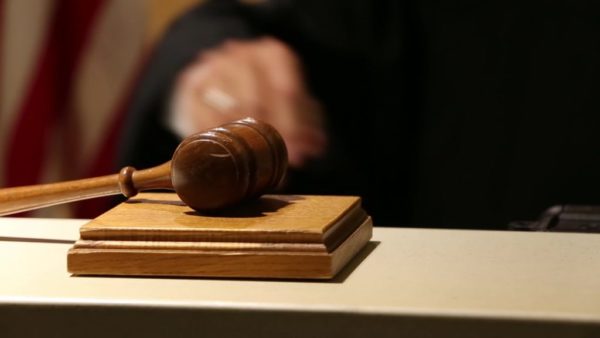
Judges can choose between three types of pensions
Let's start with the general civil insurance pension. The formula for it looks like this: individual coefficient * point value + (fixed payment * increase coefficient). Let’s say a judge receives a monthly salary of 70 thousand rubles. Under pension legislation and modifiers adopted in 2020, this gives about 8.25 pension points annually. At the current value of a pension point of 87.24 rubles for 20 years of service, the total amount of payments will be 81.5 * 8.25 * 20 = 14394.6 rubles + 5334 rubles of fixed payment. In total, the judge will receive 19,728.6 rubles monthly.
When applying for a long-service pension, the judge’s salary is multiplied by a percentage coefficient, which depends on the legal experience. Here the calculation is much simpler: after a judge reaches 20 years of service, his pension will be 50% of his salary, and each year worked will add another three percent on top to a limit of 85%. With 20 years of service and 70 thousand salary, the judge will receive a pension of 35 thousand, with 25 years - 48,750 rubles (65% of the salary), with 30 years or more - 63,750 rubles (80% of the salary).
Finally, a lifetime allowance will give 56 thousand income under the same starting conditions, since the countdown starts not from 50, but from 80%. With 25 years of service, the pension will also reach its limit of 63,750 rubles.
Calculator for calculating the lifetime allowance of a judge
The calculator below will help you calculate your judge's lifetime allowance.
Go to calculations
Useful video
You can find out what kind of pension a federal judge has in the following video:
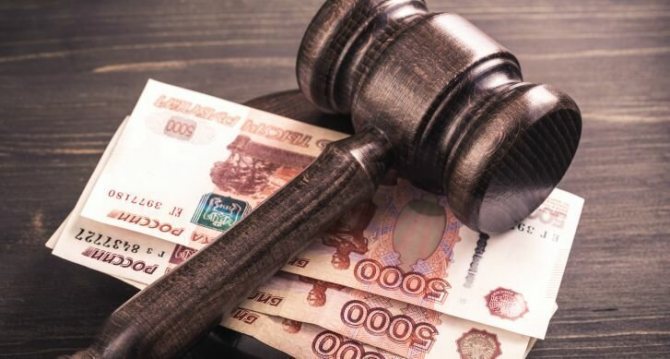
Working in a judicial position involves a large number of guarantees, incl. financial. Their pensions are a lifetime allowance, not much smaller in size than their salaries. But a standard insurance pension on a general basis is also possible. Previously, the possible pension of the current heads of the Supreme and Constitutional Courts of the Russian Federation was calculated.
How to apply for a pension?
Receipt of funds from the federal budget is carried out at the request of the judicial department or regional administration. To arrange maintenance, the easiest way for a judge is to contact the place of previous work: it is the courts that decide the issue of accrual; the Pension Fund is not involved in the matter. The former judge must provide a set of documents:
- Handwritten content statement.
- Identity card (general civil or service passport of the Russian Federation).
- Work book confirming the declared length of service.
- SNILS card.
- Confirmation of qualification level.
- Certificates or evidence of regalia providing additional benefits.
The review takes two working weeks, after which the applicant is notified of the decision. Payments are made starting from the next calendar month after registration of the application.
Summarizing the above, we can highlight a number of features of the formation of pensions for judges and other court employees:
- payments apply to judges with significant length of service;
- the lifelong maintenance provided in the worst case is 4/5 of the salary, and is not taxed;
- the issue of payments is decided by the judicial panel; the Pension Fund does not participate in the discussion.
An important nuance: when receiving a pension, a judge does not have the right to continue practicing law, and officially returning to work will lead to a freeze in payments. The law has three exceptions in this regard: literature, science and teaching.
The procedure for processing documents to obtain PSS

To apply for lifelong security, you must contact the competent authority that is tied to the place where you are employed.
The following documents will be required:
- application for registration of life security;
- passport (or other documents confirming the identity of a citizen);
- documents that confirm work experience as a judge or other legal specialties (such documents primarily include a work book), various titles and assigned classes.
Provision of military judges
Retired judges who worked in military courts receive exactly the same subsidies from the federal budget as civilian specialists. Both the age of exit and the amount of compensation, as well as other criteria, coincide. The exception will be the basic length of service - for the military, the minimum period will be 15 years.
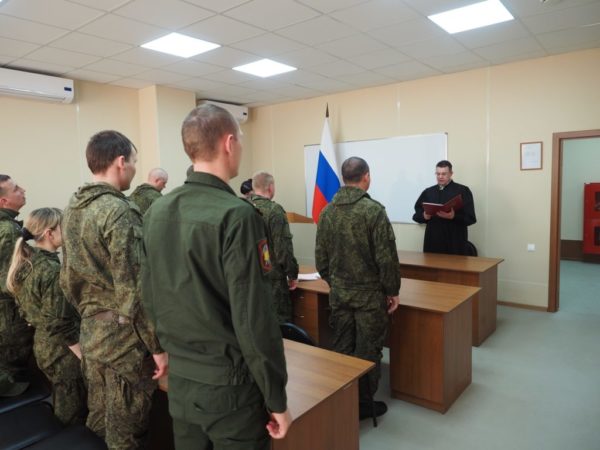
To qualify for a long-service pension, military judges must work less than civilians - 15 years
Retired military judges receive additional benefits for injuries sustained as a result of their service. For example, lifetime maintenance can be received along with disability benefits if the judge becomes disabled due to a military injury. This often happens to lawyers who worked in hot spots in their youth. Also, disabled military judges are entitled to increased benefits.
Changes in 2020
The pension reform, along with other civil servants, also affected judges: starting in 2020, the lower limit for retirement is raised by six months until it reaches 65 years for men and 63 years for women. The minimum length of service for retirement based on length of service was increased: if previously it was possible to leave after 20 years of work, now a minimum of 25 is required.
For those who received support before 2020, nothing will change - the reform applies only to current judges and lawyers.
Denial of lifelong maintenance
Each application submitted for lifelong pension provision is considered by a judicial panel in a special manner. To refuse to issue funds to a judge who has worked for more than 20 years, the grounds must be truly significant.
- Any crime, regardless of length of service, deprives the right to work in the judiciary and leads to an automatic denial of lifelong support. The same applies to crimes committed after retirement.
- A change of citizenship is also grounds for refusal or withdrawal of benefits. The law clearly states that a citizen of the Russian Federation can receive maintenance.
- Judges who have been recalled in accordance with current legislation may also be deprived of their salaries. Here, both the reasons for the recall and the consequences of the actions that caused it play an important role.
Sometimes the denial of support is caused by a disagreement with issues in the length of service: private practice or work in a law office may, for various reasons, not be counted as legal experience. In this case, the issue is resolved either at a meeting of the board or in court.
Salaries in various categories of ships
The judicial hierarchy is as follows:
- The country's Constitutional Court is the highest authority.
- Supreme Court.
- Arbitration court.
- Federal level.
- World.
There is a big difference between the top and bottom rungs in terms of salaries and incentives. Thus, a top-ranking judge in 2020 earns more than half a million rubles a month, while his opponent, who is at the first level, receives from 50 to 80 thousand.
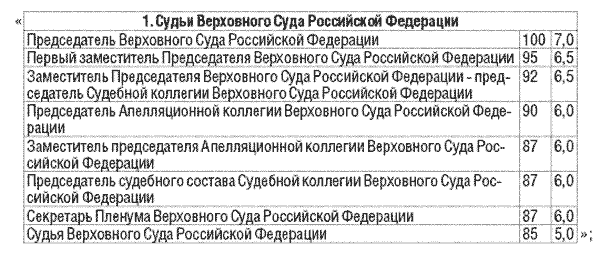
Official salary of a municipal court judge in Moscow
The second-highest salary is a Supreme Court judge. 300,000 rubles come into his account every month. Next come arbitration judges - 200,000 rubles and their colleagues federal judges - 140,000 rubles.
Return to contents
What are the salaries of foreign colleagues?
The issue will not be closed if we do not briefly consider the salaries of foreign representatives of the judiciary in 2019-2020. Alas, our judges will be ashamed to compare salaries with colleagues from more prosperous countries. We are ranked 37th on the list, which includes 46 countries.
Judges are most loved in Switzerland. They receive 101,000 € per year. And this is net. In Andorra this figure is 70,000 €, in Norway – 63,000 €. The most deprived are the judges of Moldova, earning an average of 2,000 €.
Indexation of judges' salaries in Russia has been cancelled. Whether this will lead to a new rise in corruption is unknown. As for the court staff, there is hope that their situation will improve in the near future.
Finally, it remains to note that I would like to see the same high salaries in other areas of activity where people do not have the opportunity to take bribes and thereby show the Government that it is time to raise salaries.
You can also find out what salaries are paid to officials, social workers and military personnel.
Additional payments
In addition to direct salary, each judge receives incentives. Their magnitude can reduce or increase the difference between representatives of various judicial categories. In this case, the calculation is carried out on an individual basis.
First of all, when remunerating labor, the qualification level of a specialist is taken into account. Judges are required to prove their professionalism every 3 years. Advanced training courses are organized on the basis of legal educational institutions. Internships and other ways to improve the level of professionalism are also provided for this category of employees.
The result of such retraining is the assignment of a new class (from 1 to 10) category to the judge, which, in turn, affects the additional percentage of accruals to wages.
Return to contents
Question answer
Pension for judges who became disabled in 1999
The legislator establishes that judges who become incapacitated due to the performance of their powers or regardless of their official activities have the prerogative to calculate a pension in proportion to the salary of the judge currently serving.
Can a retired judge work as a judge?
Retired judges have recently been allowed to hold public office, as well as work as arbitrators and act as arbitrators. Moreover, salary does not in any way affect the payment of pension benefits.
Pension for assistant judge
From all of the above, the following conclusions can be drawn:
- if there is length of service, the judge has the right to choose between a pension and lifelong maintenance;
- In terms of the volume of payments, PSS is much more attractive than regular pension compensation;
- After a judge’s well-deserved retirement, he remains a member of the judicial community and retains all preferences;
- For a constitutional judge, it is necessary to serve in office for 15 years in order to have the prerogative to issue a PSS;
- 80% of the salary of a current judge is allocated for the indefinite maintenance of a retired judge;
- A distinctive feature of calculating salary for a military judge is considered to be 15 years of experience;
- Employees of the judiciary receive 2-3 times less income than guards of justice. Consequently, their pension payments are small;
Issues regarding the assignment of content are considered by the Commission at the Judicial Department.
Salaries of other court employees
A judge cannot do without assistants. The staff of various courts includes secretaries and assistant judges. Their salary is not tied to the salaries of managers. This makes the assistant referee's salary dependent on regional rates. The highest salaries are in Moscow and St. Petersburg, lower in the periphery.
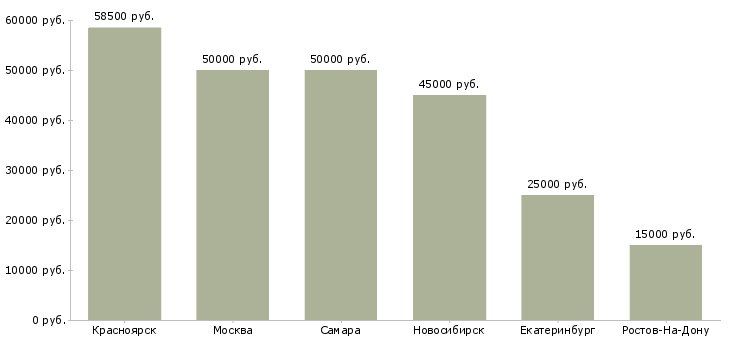
Salary of an arbitrator by region of Russia
On average across the country, judicial assistants and secretaries earn about 30,000 rubles per month. Considering that these representatives of justice bodies are extremely busy with work and, like managers, bear great responsibility, the Government of the Russian Federation is considering the issue of linking the salary of other judicial employees to the basic salary of a judge.
This will make the position not only more prestigious, but also more profitable. After the Government’s plans are implemented in practice, the salaries of other court employees will increase. Since the position of assistant will receive the status of a civil service, the salary will be indexed, like the salaries of managers.
Return to contents
Determining the size of the teaching staff
According to the Federal Law “On the Status of Judges”, the size of the teaching staff pension is determined based on the official salary and length of service of representatives of the judicial system. Subject to compliance with established legal norms, representatives of the system can apply for a lifetime pension in a certain amount.
The amount of lifelong support depends on the work activity of judges in courts of a certain competence:
- Constitutional Court. Provided that a judge has at least 15 years of service, monthly pension payments will be 80% of the established official salary.
- Courts of general jurisdiction of the constituent entities of the Russian Federation (Federal judges). Provided that a judge has at least 20 years of service, the monthly teaching staff amount will be 72-80% of the official salary.
- City and district courts of general jurisdiction. With at least 20 years of service as a judge, the monthly allowance will be 67-70% of the salary.
- Military courts. If a judge has at least 15 years of service, the monthly salary will be 85-100% of the salary.
- Garrison ships. If you have served as a judge for at least 20 years, the amount of maintenance will be 72-77% of the salary.
- Arbitration courts. For arbitrators, the judicial experience for assigning pension benefits is 20 years, and the size of the teaching staff is 82-90% of the salary.
- Justices of the peace. If you have served in office for at least 20 years, the pension of a magistrate will be 60-64% of the salary.
| Amount of lifetime pension provision for judges in the Russian Federation | ||
| Experience | % of salary | |
| Constitutional Court | 15 | 80 |
| Subjects of the Russian Federation (Federal judges) | 20 | 72-80 |
| City and district courts | 20 | 67-70 |
| Military courts | 15 | 85-100 |
| Garrison ships | 20 | 72-77 |
| Arbitration courts | 20 | 82-90 |
| Justices of the peace | 20 | 60-64 |
In addition to the indicated percentages, judicial employees are additionally charged 1% of the salary for each additional year of work (exceeding the established threshold of length of service).
Excursion into history
In order for the review to be complete, the issue should be considered in dynamics. Until recently, or rather in 2012, a judge of the Constitutional Court earned a little more than 70,000 rubles, his colleagues in the Supreme Court - only 60,300 rubles, and the Arbitration Court - 50,400 rubles. Today, the salary level of Supreme Court employees corresponds to the salary of a magistrate judge, who is at the bottom level of the hierarchy. This means that the indicators have increased several times over a short period of time.
The reason for such a rapid rise is associated with a government program that came into effect in 2012. Then it was decided to review the income of civil servants. A strategy to increase them was developed. The program also included courts of all categories.
The main incentive for the development of a new policy of remuneration and incentives for judges was corruption. Civil servants earning slightly above the national average were often tempted to receive several times more by accepting bribes. The new policy forces them to hold on to their place and not give in to temptations.

We should not forget about the risks associated with the profession. Judges are often threatened and pressured by criminals and members of their families, trying to find a weak point in justice. The program made justice stronger and not subject to various types of pressure.
In 2012, a start was made to increase the salaries of judges. So in 2019 they grew by 5.5%. Compared to the first step, the subsequent ones were less significant.
Return to contents






